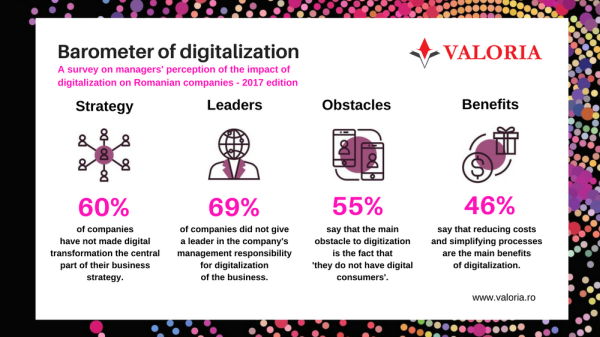„The Internet and technology have led to an exponential increase in the speed, volume and diversity of information. Easy access to consumer information has led to changes in consumer habits. Digital consumerism imposes new challenges on companies, but also brings them opportunities if they understand the phenomenon of digitalization and integrate it into their business model. The Barometer of digitalization is the study that shows the level of maturity and understanding of digitalization by Romanian companies, the obstacles they face, but also the benefits they hope to gain from this process”, says Constantin Magdalina, Emerging Trends & Technologies Expert, co-author of the survey.
The confidence in digitalization
It is said that digitalization is a phenomenon that will not escape any business model and no field of activity. Even if there are still voices claiming that not all industries will be transformed by digitalization, the technological advances in Big Data Analytics, cloud, artificial intelligence, the Internet of Things (IoT), robots and drones make this scenario unlikely.
In Romania, 35% of companies say that digitalization has already had a big influence on their business, but only 31% are confident about the success of digitalization and believe they have the knowledge to navigate the process. 61% of companies say they have difficulties with digital transformation. Of these, 39% are reluctant to capitalize on this trend. Only 2% say they do not trust that digitalization is good for the company.
The maturity of digitalization
As per the stage reached on the road to digital transformation, according to the criteria of a Forbes study replicated by the Valoria study for Romania, companies can be classified in the following 5 types:
- Traditional– 10% globally, 23% in Romania – Companies which have inadequate technologies and limited use of digital data.
- Beginners– 14% globally, 37% in Romania – Companies which started to implement technologies (for example, cloud and mobile) and/or strategize about the role of digital transformation for our business.
- Minimalist– 31% globally, 24% in Romania – Companies which created an adequate technology infrastructure and basic strategy for digital transformation and some digital solutions.
- Avanced– 32% globally, 9% in Romania – Companies which created a technology infrastructure and enterprise-wide strategy for digital transformation and digital technologies.
- Leaders– 13% globally, 7% in Romania – Companies which did an enterprise-wide integration of digital technologies and have digital technologies that lead to substantial improvements in the business.
Digital business models
Against the backdrop of rapid technological advances, digitalization has become a priority for all industries, often radically changing business models. At present, 19% of Romanian companies believe that digital business models have greatly changed their industries, and 21% of companies expect digital business models to greatly transform their industry in the next 1-3 years. Only 4% believe that the industry in which they operate is not affected in any way by digital business models.

Leaders’ responsibility
The present Valoria study reveals that 7 out of 10 companies have not given the responsibility of a leader in the company's top leadership for digital business development. The consequences can range from delays in strategic decisions, insufficient support for the implementation of digital transformation strategies, to inefficiencies in achieving technology integration across the company, etc. Moreover, the research results show that 63% of companies do not have enough knowledge and expertise at the level of top management for managers to assess and develop a digital business model.
Competitors and competitive advantages
Most companies in Romania (31%) believe that their competitors are only somewhat affected by digitalization, 24% think that competitors have been a great deal affected by this process and 16% think competitors have been to a great extent affected by digitalization. Only 3% think that their competitors are not affected at all by this phenomenon. On the other hand, 63% of respondents say they have not capitalized on digitalization to have a competitive advantage.
Obstacles to digitalization
The main obstacle that companies see in the way of digital transformation is the perception they have at this time that they do not have digital consumers. This indicates the need for a better understanding of the mechanisms of digital interaction with consumers, as on average 60% of the purchasing process takes place online, whether B2B or B2C. In the second place, 37% of companies even recognize their own resistance to change as a barrier to digitalization, and 23% see the financial costs of undergoing this process as too high. For 19% of companies lack of digital competences among employees is an obstacle preventing them from advancing in the digitalization process, unlike 16% who see an obstacle in the absence of digital competences among top management.
Benefits of digitalization
The most important cumulative benefits of the digitalization process over the next 5 years for Romanian companies are the following: cost reduction (46%), process simplification (46%), increased operational efficiency (35%), ability to better measure company performance (34%) and improving decision-making with data analytics (33%). On the last place is to facilitate the recruitment and retention of employees (3%).
„The Barometer of digitalization is among the few studies that aim to discover how companies in Romania are undergoing the process of digitalization. As this phenomenon has a major impact on all industries and radically transforms companies, such a study is not only useful but also necessary. Under the impact of digitalization, companies are reshuffling their way of doing business, and from this study we can see how prepared the Romanian companies are at this time to deal with the digital future”, says Elena Badea, Managing Partner Valoria, co-authore of the surveyi.

































